Relational Trauma and Its Effects on Mental Health
Relational trauma refers to the emotional wounds and distress in interpersonal relationships. It can stem from various experiences, such as childhood abuse, neglect, or prolonged exposure to toxic relationships. These traumatic events can profoundly impact an individual’s mental health, leading to symptoms like anxiety, depression, and post-traumatic stress disorder (PTSD).
Relational trauma impacts a person’s ability to create and sustain good relationships, making it difficult to live with. Recognizing the signs of relational trauma and seeking appropriate help to promote healing and restore hope is crucial.
What is PTSD Counseling and How Can it Help with Relational Trauma?
Post-traumatic stress disorder (PTSD) counseling, commonly referred to as trauma-focused therapy, is a specialized form of treatment that tackles the underlying causes and symptoms of PTSD brought on by relationship trauma. It is a collaborative and evidence-based approach designed to provide individuals with the tools and support they need to heal from their traumatic experiences.
PTSD therapy helps relational trauma victims realize how their history affects their relationships and well-being. It provides a safe and empathetic space for individuals to explore their feelings, process their trauma, and learn healthy coping mechanisms.
The Benefits of Seeking PTSD Counseling for Relational Trauma
Seeking PTSD counseling for relational trauma can have numerous benefits for individuals struggling with the aftermath of traumatic experiences. Here are some of the key advantages:
Validation and Empowerment
One of the most significant benefits of PTSD counseling is the validation and empowerment it offers. Therapists specializing in trauma understand relational trauma’s complexity and unique challenges. Through therapy, individuals receive validation for their experiences, feelings, and reactions, helping them regain a sense of self-worth and empowerment.
Coping Skills for Relational Trauma
Relational trauma often disrupts an individual’s ability to regulate their emotions effectively. PTSD counseling equips individuals with practical coping skills and techniques to manage overwhelming emotions and triggers. These skills enable individuals to regain control over their lives and successfully navigate future challenges.
Restoring Trust and Building Healthy Relationships
Relational trauma can profoundly affect an individual’s ability to trust others and form healthy relationships. PTSD counseling focuses on rebuilding trust and developing healthier patterns of relating to others. Through therapy, individuals can learn to establish boundaries, communicate effectively, and develop resilience in their relationships.

How to Find a Qualified PTSD Counselor in NYC?
Finding a qualified PTSD counselor in NYC is essential to ensure you receive the appropriate support and guidance to address your relational trauma effectively. Here are some steps to help you in your search:
1- Seek Referrals and Recommendations
Start by seeking referrals and recommendations from trusted sources, such as your primary care physician, mental health professionals, or friends and family who have undergone therapy. Their professional or personal experience can inform their advice.
2- Research and Verify Credentials
Once you have a list of potential counselors, take the time to research their credentials and background. Look for professionals who specialize in trauma-focused therapy, have relevant training and experience, and are licensed to practice in NYC. Verify their credentials through professional organizations and online directories.
3- Arrange Consultations
Before committing to a PTSD counselor, arranging consultations with a few potential candidates is crucial. This will allow you to assess their compatibility, approach, and expertise in addressing relational trauma. Use this opportunity to ask questions and gather information to help you make an informed decision.
Therapy Techniques Used in PTSD Counseling include:
- Cognitive Behavioral Therapy (CBT)
- Eye Movement Desensitization and Reprocessing (EMDR)
- Dialectical Behavior Therapy (DBT)
Related Article: DBT Therapy in NYC
What to Expect in Your First PTSD Counseling Session?
Attending your first PTSD counseling session can feel daunting, but it is an essential step toward healing and growth. Here’s what you can expect during your initial session:
Assessment and Intake
Your first session will typically involve an assessment and intake process. To assess your needs, the counselor will ask about your background, trauma, and symptoms. This information will help guide the therapeutic process.
Establishing Goals and PTSD Treatment Plan
Based on the assessment, your counselor will work with you to establish treatment goals and develop a personalized PTSD treatment plan. This plan will outline the therapy techniques and strategies that will be used to address your relational trauma effectively.
Building Rapport and Trust
Establishing a trusting and supportive therapeutic relationship is crucial for the success of PTSD counseling. Your counselor will focus on building rapport and creating a secure space to share your feelings. They will provide empathy, validation, and support throughout your healing journey.
Seeking PTSD counseling for relational trauma can be a life-changing decision. It allows individuals to heal, regain control over their lives, and form healthier relationships. By understanding the benefits of this specialized form of therapy, finding a qualified counselor, and knowing what to expect, individuals can embark on a healing journey, finding the healing and hope they deserve.
Related Article: Childhood Trauma on Adult Mental Health
